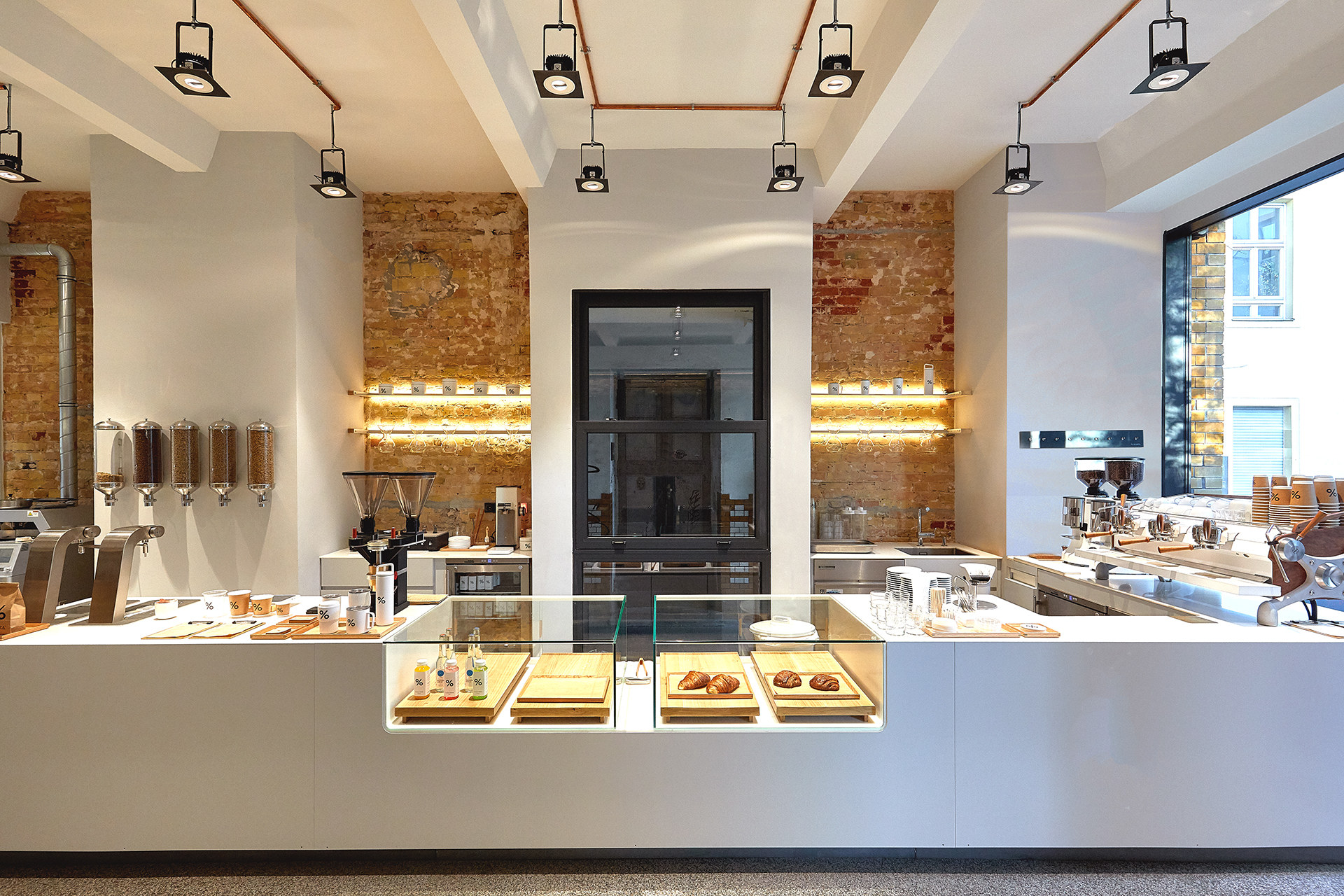Delightful Coffee and International Vibes at % Arabica Berlin
Photo courtesy of % Arabica Berlin
Located in a typical backyard in one of the city’s most dynamic and vivacious areas, % Arabica – already a household name among coffee enthusiasts worldwide – recently opened its first European branch in Kreuzberg, Berlin.
% Arabica was established by Kenneth Shoji in Kyoto, Japan in 2014 and has since expanded to different countries all over the world, encouraging its customers to “see the world through coffee”. % Arabica has become well known both for its delicious coffee and striking interior design.
“The coffee that we source from all over the world and directly from the farmers has a very high quality,” said Timo Meyer, Managing Director of % Arabica Berlin. “We import green coffee beans and roast them with a special machine from Japan called Tornado Air Roaster. That way, we can roast smaller amounts of coffee bean within short periods of time.”
In addition to the Tornado Air Roaster, % Arabica also uses other state-of-the-art machines and technology, such as the Slayer espresso machine, which was imported from Seattle and is the most eye-catching piece in the coffee shop thanks to its sleek design.
Photo courtesy of % Arabica Berlin
“I don’t think there’s any other coffee shop that emphasizes its interior as much as we do – we pay a lot of attention to even the smallest details,” Timo explained. (The coffee shop even features a typical Japanese toilet!)
So far, there are 25 % Arabica coffee shops worldwide, all of which have been created by Japanese designer Masaki Kato who was able to transform % Arabica’s vision perfectly.
“We want our outlets to look simple yet appealing, and most of all, timeless, just like good coffee should be timeless,” Timo said. “That’s why we also don’t feel the need to follow every single trend but stick to our own concept and philosophy.”
Obviously, % Arabica’s main focus has been of coffee, and in most of the coffee shops, there is no food available besides pastry. The new outlet in Berlin, however, takes a different approach. The open kitchen reveals insights into the diligent food-making process.
“We have decided to introduce a real menu because we have so much space here, which would have been wasted otherwise,” Timo said. “Additionally, the consumer behavior in Europe differs from Asia or the US where the to-go culture is prevalent. Here, people tend to sit down and stay for a while – especially in Germany, where the so-called kaffeeklatsch is extremely popular.”
% Arabica serves breakfast every day until noon, followed by lunch until 2.30 PM (the chef creates new dishes on a weekly basis). Meanwhile, cake and pastries are available the whole day. On weekends, brunch is available between 10 AM and 4 PM. A multicultural team that hails from all corners of the world including Japan, Hong Kong and the US, looks after customers and pays attention to their every need.
Photo courtesy of % Arabica Berlin
“We have a lot of Japanese customers because the brand is already well known in Japan and Asia,” Timo continued. “At the moment, I’d say around 30 percent of our customers come from Asia. Kreuzberg is home to quite a big start up scene, so a lot of entrepreneurs come to Arabica to work on their laptops – that’s what our communal table is for. All in all, I’d say that we have a colorful mix of customers and visitors here, which radiates a very international atmosphere.”
% Arabica will open in Paris, London and Lausanne next, while another outlet is planned in Belgium next year. When asked why they chose Berlin as its European headquarters, Timo said that Berlin is well on its way to become the continent’s capital of coffee.
“Over the past couple of years, the Berlin’s coffee scene has evolved immensely, especially in the premium segment,” he explained. “It has become a coffee hotspot, and people come to Berlin specifically to explore its numerous coffee shops. Moreover, Berlin is one of the most popular cities in Europe in general, thanks to its vibrant atmosphere that attracts people from all walks of life, be it artists, hipsters or entrepreneurs.”
Timo added that they consciously avoided opening % Arabica in one of the highly frequented areas, like Kurfürstendamm.
“Instead, we were looking for a location that shows the most promising future prospects because we believe that these areas also attract the most interesting people,” he said about their decision to set up shop in Kreuzberg. “If we manage to lure them to our place, the rest will follow automatically.”
For more information, visit % Arabica.


